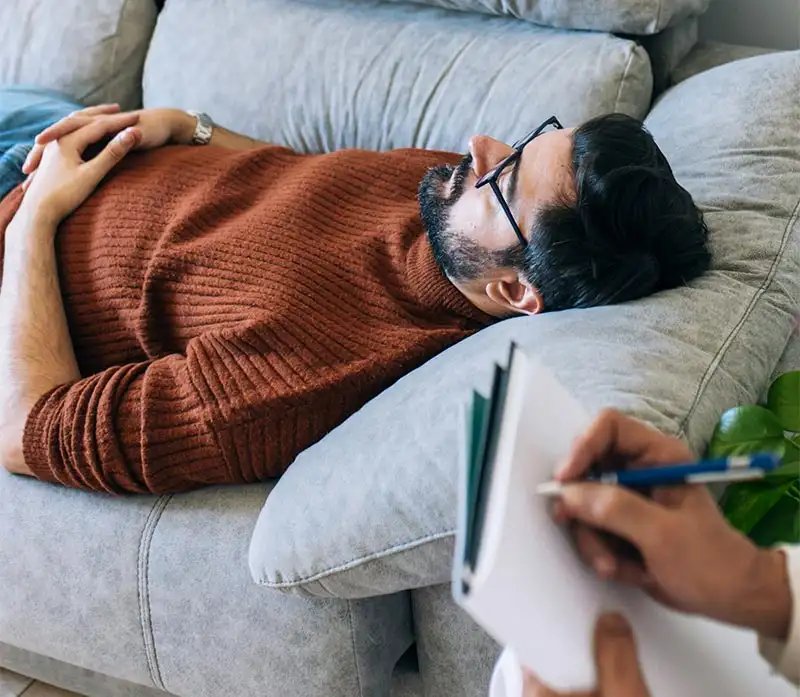
8.5% of adults aged 18 or older (approximately 21.9 million people) experienced a past-year MDE.
5.9% of adults (around 15.3 million people) had a past-year MDE with severe impairment.

Major Depressive Disorder (MDD), also known as clinical depression, is a mood disorder characterized by persistent feelings of sadness, hopelessness, and a lack of interest in activities that were once enjoyable. Unlike temporary periods of sadness, MDD affects every aspect of a person’s life, making it difficult to function in daily activities, work, or relationships. It can cause a range of emotional, cognitive, and physical symptoms, including:
At Compassion Recovery Centers, we specialize in helping individuals struggling with Major Depressive Disorder regain their emotional balance, improve their quality of life, and move toward recovery. Our comprehensive and compassionate treatment approach addresses the whole person—mind, body, and spirit.
Major Depressive Disorder requires a tailored, integrated approach to treatment, as depression affects each individual differently. At Compassion Recovery Centers, we offer a combination of evidence-based therapies, medication management, and wellness strategies to help individuals manage their depression and work toward healing.
Cognitive Behavioral Therapy (CBT) is one of the most effective therapies for treating Major Depressive Disorder. CBT helps individuals identify and change negative thought patterns that contribute to feelings of hopelessness and despair. By learning to recognize and reframe unhelpful thoughts, clients can begin to view themselves and their circumstances more positively, which can significantly reduce depressive symptoms.
CBT also includes:
Interpersonal Therapy (IPT) focuses on improving interpersonal relationships and communication skills, which can be a significant source of stress and sadness for those with depression. IPT helps individuals address social issues such as conflicts, grief, or role transitions (e.g., a breakup, job loss, or major life change) that may be contributing to their depressive symptoms. By improving relationships and social support, clients can experience relief from the isolating effects of depression.
For many individuals with Major Depressive Disorder, medication is an important component of treatment. Antidepressant medications can help regulate the brain chemicals (neurotransmitters) that influence mood, sleep, and appetite. Our experienced medical team works closely with each client to determine the most appropriate medication for their needs. Some common medications used to treat depression include:
Our medical professionals will monitor the effectiveness of the medication and make adjustments as needed to ensure the best results with minimal side effects.
Mindfulness-Based Cognitive Therapy (MBCT) combines elements of mindfulness meditation with cognitive therapy. This therapeutic approach helps individuals become more aware of their thoughts and feelings in the present moment, reducing the tendency to ruminate on past failures or worry about the future. MBCT teaches clients to observe their negative thoughts without getting caught up in them, reducing the power these thoughts have over their emotions and behavior. This practice helps clients prevent future depressive episodes by teaching them healthier ways of coping with stress and negative emotions.
Group therapy provides individuals with Major Depressive Disorder the opportunity to share their experiences and struggles with others facing similar challenges. Group sessions offer a sense of community, reducing isolation and allowing individuals to learn from each other’s coping strategies. In addition to emotional support, group therapy provides valuable feedback and encourages individuals to engage in self-reflection and personal growth.
In addition to therapy and medication, we emphasize the importance of holistic wellness practices to support mental health recovery. These strategies include:

We recognize that Major Depressive Disorder is complex, and every individual’s experience with depression is unique. Our treatment plans are designed to address the specific needs of each person, combining therapy, medication, and lifestyle strategies to ensure the best possible outcome.
Our team of therapists, counselors, and medical professionals have extensive experience in treating Major Depressive Disorder. We provide compassionate, non-judgmental care in a safe and supportive environment, where clients feel empowered to heal and recover.
We believe in treating the whole person—mind, body, and spirit. Our holistic treatment approach focuses on healing not only the emotional and mental aspects of depression but also promoting overall wellness and balance.
Our center in Southern California offers a peaceful, tranquil setting that promotes healing and personal growth. Clients can feel safe and supported as they work through their recovery, free from the distractions of daily life.


We strive to offer the best treatment experience and believe that through our proven program, that we can help you not only overcome mental illness, but achieve a fulfilling life full of gratitude and compassion beyond what seems possible at the beginning of your path to recovery.
If you or a loved one is struggling with Major Depressive Disorder, Compassion Recovery Centers is here to help. Our Major Depressive Disorder Treatment Program provides the tools, support, and care necessary to help individuals overcome depression and live a fulfilling, balanced life.
Contact us today to learn more about our treatment services and take the first step toward recovery.

We are 100% in Network Provider. Most of our clients pay $0 out of pocket.



